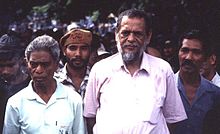Manuel Carrascalão
Manuel Viegas Carrascalão (born December 16, 1933 in Atauro / Portuguese Timor , † July 11, 2009 in Dili ) was a leader of the East Timorese independence movement and President of the National Council during the administration of East Timor by UNTAET .
Life
Manuel Carrascalão was born as the son of Manuel Viegas Carrascalão on Atauro, an island that belonged to Portuguese Timor . His father had been exiled there because he had repeatedly been politically active during the Salazar dictatorship , despite the prohibition . Manuel dropped out of his studies in Portugal early because he started working with his father at an early age. In 1974 Manuel Carrascalão became a member of the National Assembly. During the Carnation Revolution on April 25, 1974, he was in Lisbon . Carrascalão returned to East Timor with his brothers Mário and João and with them both founded the União Democrática Timorense UDT (Democratic Union of Timor), the first political party in East Timor. Manuel wrote the UDT's party program. The party advocated close ties to the former colonial power Portugal or, as they said in Tetum: "mate bandera hum" - in the shadow of the Portuguese flag . Finally, the UDT supported a gradual approach to independence. After the failed coup attempt against FRETILIN on August 11, 1975, Manuel Carrascalão fled to Atambua in the Indonesian West Timor . Now he spoke out in favor of a connection between East Timor and Indonesia. In December 1975, Indonesia occupied the country.
When Manuel Carrascalão criticized the raids and murders of civilians, he was deported to Kupang in West Timor, where he stayed for five years. After his return in 1980, Carrascalão worked in the local administration and , like his brother Mário, became a member of the Provincial Assembly of East Timor for the Golkar . In December 1997 Carrascalão founded the Movement for Reconciliation and Unity of the People of Timor (GRPRTT) and in 1998 the Movimento precursor do Referendo em Timor MURPTL (pioneering movement for the referendum in Timor). The local Indonesian military commander threatened to arrest Carrascalão. Finally, Carrascalão became spokesman for the Conselho Nacional de Resistência Timorense CNRT (National Council of Resistance of Timor) .
In the run-up to the independence referendum in East Timor in 1999 , pro-Indonesian militias and security forces attacked Manuel Carrascalão's home in Dili . His 17-year-old son Manuelito was among the at least 19 victims . Manuel Carrascalão and his daughter initially found refuge in the residence of Bishop Belo . He then fled first to Jakarta , then to Portugal, and did not return to East Timor until October 1999 after the referendum on independence.
After the United Nations took control of East Timor in 1999, Carrascalão was from April to September 2001 chairman of the National Council (NC), a kind of transitional parliament under the administration of UNTAET. In the first election to the parliament of East Timor, he no longer ran. In 2009 Manuel Carrascalão died of a cerebral embolism in a hospital in Dili.
See also
- History of East Timor
- Carrascalão
- José Manuel Carrascalão , son of Manuel Carrascalão
Web links
- Eyewitness account by Victor do Santos Lay
- Excerpts from Timor-Leste's CAVR Report on the Carrascalao House Massacre (April 17, 1999)
Individual evidence
| personal data | |
|---|---|
| SURNAME | Carrascalão, Manuel |
| ALTERNATIVE NAMES | Viegas Carrascalão, Manuel |
| BRIEF DESCRIPTION | East Timorese independence leader |
| DATE OF BIRTH | December 16, 1933 |
| PLACE OF BIRTH | Atauro , Portuguese Timor |
| DATE OF DEATH | July 11, 2009 |
| Place of death | Dili , East Timor |

